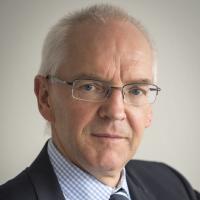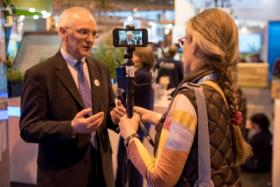
Reading time 5 min
Christian Huyghe: Adding value to research
Published on 12 April 2016
Agricultural science was a natural choice for Huyghe, the son of a farmer. His decision to study plant breeding was spurred by a meeting with Yves Hervé, a professor at the National Institute for Advanced Studies in Agricultural Science in Rennes, whose good nature had a profound impact on Huyghe. “I chose the man before I chose the field of study. He taught me that the purpose of research is to deliver progress to users.” Huyghe says there is no doubt of the influence others have had. “Careers are built on all of the people we’ve had the good fortune to meet along the way, and I’ve met so many exceptional people.” Huyghe’s career path choices have certainly also been guided by his strong and growing conviction that promoting innovation, knowledge transfer, and training will benefit the agriculture of tomorrow.
Christian Huyghe, Scientific Director of Agriculture at INRAE, the new institute for agricultural research formed following the merger of INRA and IRSTEA, explains the Institute’s scientific ambition.
“What are the stakes of tomorrow’s agriculture? To achieve sufficient agricultural production to ensure global food security and maintain the income of economic stakeholders while taking into account environmental challenges. Farming-related greenhouse gas emissions must be reduced at a time when climate change is lowering our production capacities. We must also take action to support biodiversity. Simply limiting the impact of farming activities on biodiversity will no longer suffice – we must urgently work to restore these resources.
How will we do this? By relying on agroecological principles, which consist in using biocontrol to ensure both environmental protection and productive performance. Biocontrol also seeks to achieve mutual benefits from animal and plant production, particularly in terms of soil fertility. This brings up questions about the type of animal production we want for our society, especially regarding animal welfare. We study all of these topics using participatory approaches that bring together agricultural professionals, actors further down the supply chain, and citizens.
INRAE’s greatest advantages are its recognised scientific excellence and effective academic and professional partnerships. Another key advantage is the creation of an Expertise and Support for Public Policy Directorate (DGDEAPP): public policies are extremely important for the transitions of production systems. They are not there to restrict but rather to guide and support the transition.”
Sowing the seeds of innovation
Meeting the needs of tomorrow: if we’re not doing that, we’ve already fallen behind!
Christian Huyghe is in a hurry. Two years and three months were all he needed to prepare his thesis at INRA Versailles describing an as-yet unknown phenomenon of cellular biology: haploid–diploid polyembryony in flax. At the time, a Chinese publication identified that it was possible to use the “doubled haploid” technique – a technique for shortening plant breeding cycles – in flax through in vitro culture. “We realised quite quickly that was not true, so we looked for other methods.” An opportunity presented itself when Huyghe ordered seeds from an Australian team that had been recently obtained through crossbreeding a certain flax strain that had haploid and diploid embryos. “That made it possible to do cytological studies.” Huyghe knew how to make the most of this lucky strike, which led to the development of a selection method still in use today.
In 1987, he joined INRA’s research centre in Lusignan where, until 2003, he carried out research on genetic improvements in plants, starting first with white lupin, then alfalfa and grasslands. He also served as unit director and president of the INRA Poitou-Charentes centre. Be it for plant or animal science(1), for Huyghe, the aim is always the same: “to meet the needs of tomorrow. If we’re not doing that, we’ve already fallen behind! It’s important to strike a balance between research and what people need.”
Strengthening ties with society

Huyghe seeks to carry this same sentiment over into what he refers to as his “parallel life”. “I do my best to build and deepen our relationships with socio-economic and institutional partners.” Since 1997 and at the request of Guy Riba, who held several science management roles at INRA, Huyghe has led the Grasslands and Forage Crops Industry Group. He is also president of the Variety and Seed Study Group (GIP–GEVES) and has been a member of the Technical Committee for Plant Breeding (CTPS) since 1990. “What I love about the CTPS is the fact that regulatory instruments actually give direction to joint projects and bring all the stakeholders to the table for discussions. I learned that regulations compel us to be future oriented and to debate things, and that soft consensus is not the way to go.”
"Seeing, sharing, discussing, giving." F. Houllier, INRA President
He’s equally at home working on the regulatory framework for the Ecophyto 2 project (2), and the fine balancing act required in implementing a programme for certifying reductions in the use of phytopharmaceutical products through assigning value to virtuous practices. “This role is something of a ‘control tower’. Research plays a pivotal part, both by supporting public policymaking and by acting as guarantor for socio-economic partners. How can we make sure that everyone feels their contribution led to progress?”
The scope of his mission expanded markedly in 2010 when Marion Guillou, then INRA President, offered Huyghe the role of Deputy Scientific Director Agriculture under Hervé Guyomard, Scientific Director Agriculture. “The two of us are really at the nexus of both INRA’s work and its relationships with outside partners.”
Sharing the fruits of research
transmitting the benefits of scientific progress to end users
Huyghe’s primary aim is to transmit the benefits of scientific progress to end users. The approach is threefold: making public–private partnerships a driving force for innovation; supporting agricultural technical institutions to increase the visibility of their work (3); and leveraging the use of massive data archives, which is made possible when information systems are interoperable.
For Huyghe, innovation and the dissemination of knowledge go hand in hand. To this end, in 2006 he launched – again with Guy Riba’s encouragement – the Agricultural Innovation Symposia (Carrefours de l'innovation agronomique - CIAg). “There was a need to make our research more visible to people working in agriculture.” His aim was to organise agricultural symposia that would be coupled with the publication of an online journal. In 2010, symposia on food joined the mix, and in 2011 symposia on the environment were added as well. “Our goal is avoid a dialogue wholly between researchers, and to facilitate the transmission, discussion, and appropriation of knowledge by professionals.”
The other major component of innovation is training, says Huyghe. “Users will adopt something new if they understand it, and they will understand it all the better if innovation is incorporated into training itself.”
Nowadays Huyghe continues to look to the future and to explore fresh horizons, such as his new, enthusiastic participation in the Bio-Based Industries Public–Private Partnership. For someone always on the move, the question, “What’s next?” always beckons. There are new challenges to overcome and new people to meet. And for those with the good fortune to cross his path, Huyghe is assuredly one of those remarkable individuals who inspires careers and career paths.
(1) Christian Huyghe is president of the Agenae Scientific Interest Group
(2) To learn more: Ecophyto R&D: which options to reduce pesticide use?
(3) As president of ACTA’s Scientific and Technical Advisory Board
- 56, married, 3 children
- Degree in agricultural engineering, National Institute for Advanced Studies in Agricultural Science (ENSA), Rennes, France, 1983
- PhD, ENSA Rennes – University of Rennes I, 1985
- Postdoctoral fellow (undertaken as a part of his French national service), University of Reading, United Kingdom, Agricultural Botany Department, 1987
- Accreditation to supervise research, University of Poitiers, 1993
- 83 publications in international A-level peer-reviewed journals (Web of Science), 12 books or chapters in collective books, 150 oral or written presentations at international conferences
- Avid gardener
